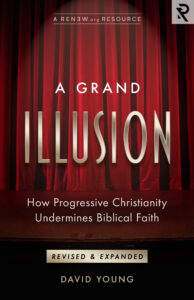In the last hundred years or so, discussions among theological progressives about the Trinity, the nature of Christ, and substitutionary atonement are often not really about these doctrines at all.
They are rather questions about the essential character of the Christian religion.
Orthodox biblical Christianity unambiguously states that humans are fallen in sin and incapable of saving themselves. Because of our sin, each of us is separated from God and deserves to be punished. But, in his great mercy, God became human in the person of Jesus, took our sins upon himself, and bore our punishment on the cross. Rising from the dead, Jesus is now the King of kings, and he calls people everywhere to repent of their personal sins, take up their crosses, and follow him. And he is going to return, raise the dead, judge humanity, banish the unrepentant, and establish a new creation.
Theological liberals proclaim a different religion. In their vision, humans are inherently good, not sinful. Jesus is not God in the flesh. Rather, he is merely a man anointed by God to show us a better way to live. Since we humans are not inherently sinful, they argue, Jesus doesn’t atone for our sins. And his ministry is not concerned with personal repentance, forgiveness of sins, and holy living.
Why Did Jesus Die?
Richard Rohr, in his article “Incarnation Instead of Atonement,”[1] goes to great length to deny the atoning nature of Jesus’ death. His argument is not based on Scripture. Rather, it is based on his sheltered belief that humans are too good to need atoning—a view very much at home in North American elite circles but hardly in line with the experiences of vast numbers of oppressed humans around the world.
So for progressives, Jesus is an activist in the image of modern Western progressivism who brings about social reform characterized by tolerance, acceptance, and the affirmations of others. Jesus did not die for our sins; instead, he died because the Roman and Jewish authorities could not tolerate his message of social justice.
Jesus was not literally raised from the dead. Rather, the resurrection is metaphorical—it is a witness to the slow and unrelenting victory of progressive values. And Jesus is not coming again to judge humanity—nobody will go to hell. Rather, we will build our own heavenly utopia here on earth using the progressive principles of liberalism—socialism, therapy, various appeals to science, etc. The last of Richard Rohr’s ten commandments for a new orthodoxy declares, “Life in this world is more important than the afterlife.”
“For progressives, Jesus is an activist in the image of modern Western progressivism who brings about social reform characterized by tolerance, acceptance, and the affirmations of others.”
The theology of the historic, biblical, and creedal gospel conflicts with the whole progressive project, which turns Christianity into a mere call for social reform. As 20th-century American Christian ethicist Richard Niebuhr once famously said about progressive theology: “A God without wrath brought men without sin into a kingdom without judgment through the ministrations of a Christ without a cross.” I might add to Niebuhr’s quote: “through a religion without a gospel.”
Why Is the Gospel Necessary?
Start with the sinfulness of humanity. The apostolic witness insists that the gospel is necessary because of the sinfulness of humanity. The Bible is clear that though humans were created good, sin has stained all of humanity.
From cover to cover, the Bible describes the sins of both Jew and Gentile and explains over and again that God is just in his punishing people for their sinfulness. This is explicitly affirmed by the whole Old Testament, by the whole New Testament, by the historic teachers and martyrs of the church, and by the great creeds and theology of the universal church.
Some sins are more social in nature—the taking of bribes, the exploitation of the poor, unjust violence, the neglect of widows, and the like. Other sins are more personal in nature—adultery, homosexual activity, lying, cheating, stealing, and so forth. Above all of these sins lies the greatest sin of all—exchanging the true God for false gods made to look like us—idolatry.
“From cover to cover, the Bible describes the sins of both Jew and Gentile and explains over and again that God is just in his punishing people for their sinfulness.”
We could list many of the Scriptures that demonstrate this non-negotiable starting point for the gospel—that we are all hopelessly lost in sin. But we don’t have to. In his letter to the Romans, the apostle Paul partially did it for us:
“All, both Jews and Greeks, are under sin, as it is written: ‘None is righteous, no, not one; no one understands; no one seeks for God. All have turned aside; together they have become worthless; no one does good, not even one.’ ‘Their throat is an open grave; they use their tongues to deceive.’ ‘The venom of asps is under their lips.’ ‘Their mouth is full of curses and bitterness.’ ‘Their feet are swift to shed blood; in their paths are ruin and misery, and the way of peace they have not known.’ ‘There is no fear of God before their eyes.’” (Romans 3:9-18, ESV, citing multiple Old Testament texts)
A Deep Depravity
One doesn’t have to be a Calvinist to affirm the biblical teaching about original sin. Arminians have their version of original sin too.[2] Both Calvin and Arminius taught that all humans are guilty and have the proclivity to sin.
And long before either Calvin or Arminius, the church knew that we humans gravitate toward sin. Augustine describes his own propensity to sin when he tells the story from his teenage years of stealing pears from his neighbor’s yard. It wasn’t the fruit he wanted; rather, it was the enjoyment of sin that he craved. And the more depraved he could appear before his buddies, the more perverse joy it gave him.[3]
Another of Richard Rohr’s ten commandments is that we should stop worrying about sex. Rohr neglects the destructive nature of the sexual revolution, as most progressives do. And he also fails to understand how the sexual appetite can actually demonstrate the inherent sinfulness of humanity.
“Long before either Calvin or Arminius, the church knew that we humans gravitate toward sin.”
With each exposure to pornography and illicit sex, a person requires increasingly perverse sexual expressions in order to find satisfaction. Child pornography is fallen human nature allowed to continue unchecked. Seems reasonable to assume that child pornographers would be among those who “stopped worrying about sex.” Though not explicitly stated, that’s the result of this kind of thinking.
Echoes of Pelagius
We can describe it in several ways, but the truth is that we sin because we love sin. And it is precisely this love of evil that contradicts the optimism of progressivism. Indeed, with the work of Augustine, by the 5th century, the Christian church had recognized that any view which presumed the general goodness of humans is not only wrong, it is heresy.
The 5th-century Pelagian controversy was exactly about this point. Though we aren’t fully sure what all he said, the British monk Pelagius argued that we humans have the capacity to live good lives on our own. Many Brits followed his optimism before the rest of the church responded by pointing out that both Scripture and experience render the teachings of Pelagius a heresy—that is, a different gospel. The optimism that liberalism brings to Christianity is unsupported by the apostolic witness; it is another gospel.[4] It shares common assumptions with Pelagianism. But it is wrong. We are simply incapable of perfecting ourselves.[5]
“We are simply incapable of perfecting ourselves.”
And this assessment of sinful humanity actually aligns with our experience. Who among us, when we finally admit the truth, couldn’t agree with Paul’s evaluation of his own sinful will:
“I do not understand my own actions. For I do not do what I want, but I do the very thing I hate….For I have the desire to do what is right, but not the ability to carry it out. For I do not do the good I want, but the evil I do not want is what I keep on doing….Wretched man that I am!” (Romans 7:15-24, ESV)
Proof of our sinful nature is all around us and offers a driving concern for any variety of human endeavors: politics, jurisprudence, psychology, sociology, and more. As G.K. Chesterton once quipped, “Original sin is the only part of Christian theology which can really be proved.”
A Naïve View for Privileged Elites
Progressives are often naïve or outright dishonest about evil, downplaying its reality or simply denying its existence. White North American elites can afford to deny evil in the world because most have never really experienced great injustice, oppression, persecution, or national calamity.
But the truth is that evil has run rampant across history. Most humans know this because most humans have experienced it—and this is why most humans could never afford the luxury of theological liberalism. This is why I say that progressivism is the religion of upper class, white Western people.
Persecuted minorities in Nigeria, Pakistan, or Tibet could never make sense of theological liberalism. Nor could the world’s hundreds of millions who live on the edges of survival. Nor, for that matter, could any culture that is not in the process of renouncing orthodox Christianity.
“Progressives are often naïve or outright dishonest about evil, downplaying its reality or simply denying its existence.”
Progressivism is, as I’ve suggested, a halfway house for restless elites who are leaving the faith and headed for unbelief in general. The victims of the evils of Stalin, Hitler, Mao, Pol Pot, and Castro were not just suffering from low self-esteem—they suffered real, horrible evil. Aleksandr Solzhenitsyn, who started out with utopic visions of social justice before he nearly starved to death in socialist gulags, captures it well: “The line dividing good and evil cuts through the heart of every human being.”[6]
Our Need for Substitutionary Atonement
And so the death of Jesus was required as an atonement for human sin. Jesus died a martyr, and there is a sense in which his death was a tragedy—insofar as human sin put him on the cross. But ultimately, the death of Jesus is about God’s grace-filled plan to save humans by taking upon himself in the person of Jesus Christ our unholiness and the penalty for our sins so that we could be restored to fellowship with him. His atonement.
The Bible explains the death of Jesus as something done for us. The scriptural evidence is overwhelming:
- “But he was wounded for our transgressions; he was crushed for our iniquities; upon him was the chastisement that brought us peace, and with his stripes we are healed.” (Isaiah 53:5, ESV)
- “He is the propitiation for our sins, and not for ours only but also for the sins of the whole world.” (1 John 2:2, ESV)
- “I am the good shepherd. The good shepherd lays down his life for the sheep.” (John 10:11, ESV)
- “And he took a cup, and when he had given thanks he gave it to them, saying, ‘Drink of it, all of you, for this is my blood of the covenant, which is poured out for many for the forgiveness of sins.’” (Matthew 26:27-28, ESV)
- “For even the Son of Man came not to be served but to serve, and to give his life as a ransom for many.” (Mark 10:45, ESV)
“For even the Son of Man came not to be served but to serve, and to give his life as a ransom for many.”
- “God shows his love for us in that while we were still sinners, Christ died for us … For if while we were enemies we were reconciled to God by the death of his Son, much more, now that we are reconciled, shall we be saved by his life.” (Romans 5:8-10, ESV)
- “In this is love, not that we have loved God but that he loved us and sent his Son to be the propitiation for our sins.” (I John 4:10, ESV)
And the list goes on … Now, it’s true that there are various theories for how atonement works, but every theory that wants to be Christian includes some version of Christ dying so that our sins might be forgiven.[7] As the Niceno-Constantinopolitan Creed succinctly puts it, “…one Lord Jesus Christ…Who for us men, and for our salvation, came down and was incarnate and…was crucified for us under Pontius Pilate.” Or, as the Westminster Confession puts it,
“Christ, by his obedience and death, did fully discharge the debt of all those that are thus justified, and did make a proper, real, and full satisfaction to his Father’s justice in their behalf.”[8]
Where We Are Without the Atonement
Progressives don’t like atonement, in part because they don’t like the concept of sin and judgment. But atonement theory is critical to the Christian faith because it preserves both God’s justice and his mercy. Indeed, without the atonement, God would be an unjust God, for it would mean that God is okay with the many crimes we have committed against one another. It would mean that God is good with a world where there is massive abuse, destruction, ethnic cleansing, racism, lying, stealing, hoarding, insulting, maiming, raping, and killing.
There is no justice where evil is ignored or denied. Wrongs must be borne by somebody: the one who commits them, the one against whom they are committed, or the world at large.
Justice demands that those who commit wrongs bear the responsibility. The God of the Christian faith is not unjust—he will hold creation responsible for the evil it commits. And to suggest, as some progressives do, that God’s punishment for our sins comes to us only in this life—when we feel shame or guilt or pain for what we’ve done—is a luxury opinion of the elite.
“To suggest, as some progressives do, that God’s punishment for our sins comes to us only in this life—when we feel shame or guilt or pain for what we’ve done—is a luxury opinion of the elite.”
The rest of the world knows better. Emmett Till was lynched in Mississippi in 1955 at the age of fourteen. To suggest that the only punishment the murderers of young innocents like Till will face is low self-esteem ridicules justice. We deserve the punishment our sins have earned. And God is going to provide it. As Jesus promised (in red letters!),
“And will not God bring about justice for his chosen ones, who cry out to him day and night? Will he keep putting them off? I tell you, he will see that they get justice, and quickly.” (Luke 18:7-8, ESV)
Cosmic Child Abuse—or a Heavenly Father’s Love?
Progressives will find a way to deny atonement because they don’t want to believe that we are sinners who will be punished by a just God. But they also avoid doctrines about atonement because they don’t like the idea of Jesus as divine.[9] Remember that progressives have leaned Unitarian for nearly two hundred years; to declare Jesus divine necessarily requires the affirmation of the rightness of the Christian religion above all other religions. It undermines universalism, a doctrine many progressives want to be true.[10]
Bottom line: the doctrine of atonement only works if Jesus is divine. If Jesus were a mere human, the doctrine of atonement would be tantamount to criminal, for it would imply that God punished the man Jesus for the sins of others.
“If Jesus were a mere human, the doctrine of atonement would be tantamount to criminal, for it would imply that God punished the man Jesus for the sins of others.”
Progressives thus reveal their disbelief in the deity of Jesus when they declare the doctrine of atonement to be “cosmic child abuse.”[11] If Jesus is divine, then God didn’t punish one man for another man’s sins. Rather, as the Bible teaches, Jesus is “God among us” (Emmanuel); Jesus himself is God, who takes upon himself the sins of the world.
[1] Richard Rohr, “Incarnation Instead of Atonement,” https://cac.org/incarnation-instead-of-atonement-2016-02-12/, accessed October 21, 2018.
[2] Arminianism forms the main Protestant alternative to Calvinism. The latter asserts double predestination—that God predestines some for heaven and others for hell. This form of predestination essentially renders free will irrelevant. For advanced Calvinists, those destined for hell must sin. Arminianism asserts that humans have a natural tendency to sin, and all will eventually sin, but that we possess the freedom of will to avoid sin. Presbyterians are Calvinist. Methodists are Arminian.
[3] Augustine, Confessions, 2.9-14.
[4] It’s worth noting that liberal optimism also fails to bring real satisfaction. Rather, it brings frustration and, many times, clinical depression—these are evidences that we know we aren’t good.
[5] A classic on the Pelagian Controversy is still the introduction entitled: “Augustine and the Pelagian Controversy” composed by B. B. Warfield in From Nicene and Post-Nicene Fathers, Series I, Volume V.
[6] Aleksandr Solzhenitsyn, The Gulag Archipelago, (New York: Harper and Row, 1973) 168.
[7] A summary of some contemporary theories can be found in The Nature of the Atonement: Four Views, eds. James K. Beilby and Paul R. Eddy (Downer’s Grove, IL: InterVarsity Press, 2006). For a contemporary defense of the classical doctrine of atonement, see Scot McKnight, Jesus and His Death: Historiography, the Historical Jesus, and Atonement Theory (Waco, TX: Baylor University Press, 2005) and John Stott, The Cross of Christ (Downer’s Grove, IL: InterVarsity Press, 2006).
[8] The Westminster Confession of Faith, 11.3.
[9] Joseph Priestly (1733-1804), a founder of British Unitarianism, went so far as to say that there is no trace of Jesus’ divinity in the Scriptures. Priestly listed many criticisms of historic Christianity in his An History of the Corruptions of Christianity (1782). He influenced early American theological liberalism, especially with his doctrine of the mere humanity of Jesus and his denial of the atonement.
[10] Regarding universalism, see the exciting new book by Michael McClymond, The Devil’s Redemption: A New History and Interpretation of Christian Universalism (Ada, MI: Baker Publishing Group, 2018). McClymond demonstrates that universalism is completely incompatible with both the Bible and historical Christian theology. Universalism is another gospel.
[11] Cf., Steve Chalke and Alan Mann, The Lost Message of Jesus (Grand Rapids: Zondervan, 2003), 182-183. Brian McLaren makes the term popular, suggesting that the doctrine of atonement renders God a child abuser. McLaren could only mean this if he didn’t believe that Jesus is God.
This article on progressive Christianity is an excerpt from David Young, A Grand Illusion: How Progressive Christianity Undermines Biblical Faith (RENEW.org, 2019). To check out the book, click here.












3 Responses
I agree that progressive theology often downplays the need for atonement, but I also wonder if evangelicals haven’t, “in sundry times and divers manners,” promoted caricatures of penal substitution that distort God’s character—pitting Father against Son or reducing the gospel to a mere transaction. In fact, I recently heard a longtime, widely beloved preacher describe the gospel in a way that (perhaps unwittingly) made God sound more like a death camp commandant approving the torture of the innocent than the Father of Jesus Christ. How practically do you recommend we keep our language about substitution faithful to the Triune God of Scripture?
That’s a brilliant question. One facet of the answer might be that we hold two in tension both that 1) Jesus asked His Father to remove the cup if possible (Luke 22:42), and that 2) Jesus knew He was laying His life down of His own accord on behalf of the sheep, even as it was in response to His Father’s command (John 10:11-18).
Yes, that’s helpful. I think you’re right that the tension is essential—Jesus both asking if the cup might pass and yet freely laying His life down in obedience. My caution is when we push for a neat, mechanical “how it works” theory and end up missing the deeper reality Paul stresses: simply that “Christ died for us.” Maybe the better posture is to bow before the mystery rather than try to reduce it. Is it, to use David’s memorable line, “a naïve view for privileged elites” that demands a theory for worshipping Christ than just a knee ready to bow at before the crucified Lord risen?